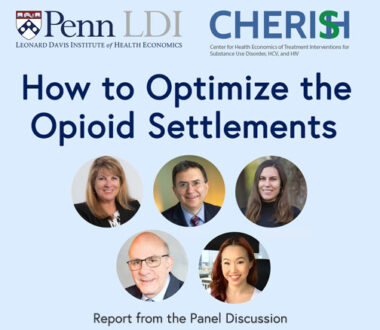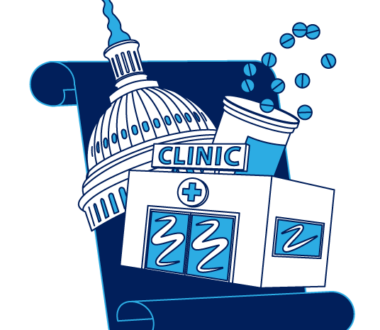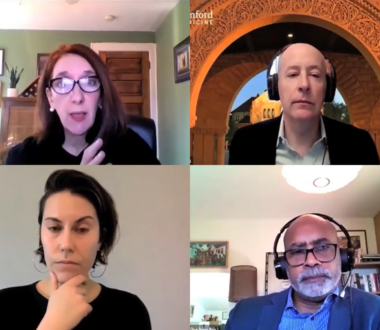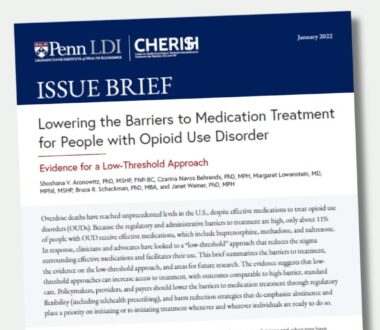
Chart of the Day: Rise in Patients with Opioid Use Disorder Leaving Hospital Prematurely
LDI Senior and Associate Fellows Ashish Thakrar, Margaret (Maggie) Lowenstein, Ryan Greysen, and M. Kit Delgado found that more people with opioid use disorder are leaving the hospital prematurely (or before medically advised), compared to marginal increases for individuals admitted for other reasons. In the study, “Trends in Before Medically Advised Discharges for Patients with Opioid Use Disorder, 2016-2020,” […]

Many State Medicaid Programs Still Require Prior Authorization for Buprenorphine Treatment for Opioid Use Disorder
The opioid epidemic has been an ongoing public health crisis in the United States, claiming countless lives and devastating communities. Buprenorphine, a highly effective medication for the treatment of opioid use disorders, holds the potential to save lives. However, a significant hurdle exists in the form of prior authorization requirements, which are associated with lower access to […]

Will States and Counties Spend Their National Opioid Settlements Effectively?
As $54 billion in National Opioid Settlement funds begin moving out toward states, counties, and municipalities, there is widespread concern among health authorities that the legal victory does not become a repeat of the 1998 mega-billion-dollar Tobacco Master Settlement Agreement fiasco in which most states used the money for just about everything except tobacco cessation […]

New Federal Rules That Lower Barriers to Opioid Care Could Save Thousands of Lives
The two main medications that treat opioid use in the United States reduce overdose deaths by 50%. Yet fewer than one in 10 people with opioid use disorder (OUD) can access this kind of medical protocol, according to the Centers for Disease Control and Prevention (CDC). Fortunately, a new law and a new federal regulation […]

Budget Impact Tool for the Incorporation of Medications for Opioid Use Disorder into Jail/Prison Facilities
Despite evidence that medications for opioid use disorder (MOUD), namely methadone, buprenorphine, and naltrexone, provided at the point of incarceration improve the well-being of the individual and the public, financial and administrative limitations in jail/prison healthcare often serve as barriers to this recommended first-line treatment for OUD. In fact, evidence indicates that more than 80% […]

A Catch-Up on Promising Efforts to Mitigate the Opioid Crisis
For the last 20 years or so, the U.S. has seen a significant increase in opioid and drug overdoses overall. And while there was a slight leveling before the pandemic, “we’ve seen huge increases since COVID-19,” said Margaret Lowenstein, an LDI Senior Fellow, addiction medicine physician, and an Assistant Professor of Medicine at the Perelman School of […]

Cost-effectiveness of Extended-release Injectable Naltrexone among Incarcerated Persons with Opioid Use Disorder Before Release from Prison Versus After Release
Compared to the general population, individuals with opioid use disorder (OUD) who are involved with the criminal-legal system have a much higher risk of a fatal overdose after release from incarceration. Yet, stigma, costs, and preferences for non-narcotic treatments in criminal-legal settings have stalled the implementation of life-saving treatment within the criminal-legal system. Extended-release naltrexone […]

Evidence for Supportive Prenatal Substance Use Policies
Increased prevalence of illicit substance use during pregnancy in the past decade has renewed national attention to prenatal substance use policies (PSUPs). Currently, there are punitive policies that criminalize drug use during pregnancy or define prenatal substance use as child maltreatment in child welfare statutes. If newborns are found to have prenatal exposure to substances […]

Providing Naloxone in the Emergency Department Can Save Lives
Overdose deaths continue to be a national tragedy. More than 800,000 Americans died from an overdose between 1999-2019, and the annual rate of overdoses has increased dramatically during the pandemic, according to the latest data from the Centers for Disease Control and Prevention. Roughly 7 in 10 current overdose deaths involve opioids, which means that […]

Why Does the Opioid Mortality Rate Continue to Rise?
From April 2020 through April 2021, there were 100,300 drug overdose deaths across the country according to the CDC — a 28.5% increase over the previous year. Some 75% of these were opioid-related overdoses that killed an average of nine users an hour around the clock throughout the year. Looking forward, the just-published Stanford-Lancet Commission on […]

Advancing Evidence-Based Substance Use Disorder Treatment Policies
If you want to reform state laws to require detox facilities to include medications like buprenorphine and methadone in their treatments, you should start by changing the “hearts and minds” of those who oppose it, Rebekah Gee, MD, MPH, MHSPR, told the January 14, 2022 Penn LDI/CHERISH Virtual Conference at the University of Pennsylvania. Keynoting a gathering organized […]

Lowering the Barriers to Medication Treatment for People with Opioid Use Disorder
Overdose deaths have reached unprecedented levels in the U.S., despite effective medications to treat opioid use disorders (OUDs). Because the regulatory and administrative barriers to treatment are high, only about 11% of people with OUD receive effective medications, which include buprenorphine, methadone, and naltrexone. In response, clinicians and advocates have looked to a “low-threshold” approach […]
Engage with CHERISH
Submit a Consultation Request or Contact Us to learn more about how CHERISH can support your research or policy goals.